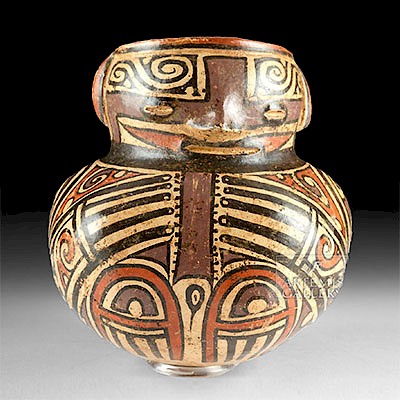Colima Pottery Standing Dog w/ Spout & No Eyes
Lot 65c
About Seller
Artemis Fine Arts
686 S Taylor Ave, Ste 106
Louisville, CO 80027
United States
Selling antiquities, ancient and ethnographic art online since 1993, Artemis Gallery specializes in Classical Antiquities (Egyptian, Greek, Roman, Near Eastern), Asian, Pre-Columbian, African / Tribal / Oceanographic art. Our extensive inventory includes pottery, stone, metal, wood, glass and textil...Read more
Estimate:
$1,400 - $2,000
Absentee vs Live bid
Two ways to bid:
- Leave a max absentee bid and the platform will bid on your behalf up to your maximum bid during the live auction.
- Bid live during the auction and your bids will be submitted real-time to the auctioneer.
Bid Increments
| Price | Bid Increment |
|---|---|
| $0 | $25 |
| $300 | $50 |
| $1,000 | $100 |
| $2,000 | $250 |
| $5,000 | $500 |
| $10,000 | $1,000 |
| $20,000 | $2,500 |
| $50,000 | $5,000 |
| $100,000 | $10,000 |
| $200,000 | $20,000 |
About Auction
By Artemis Fine Arts
Nov 8, 2018
Set Reminder
2018-11-08 10:00:00
2018-11-08 10:00:00
America/New_York
Bidsquare
Bidsquare : Ancient / Ethnographic From Around The World
https://www.bidsquare.com/auctions/artemis-gallery/ancient-ethnographic-from-around-the-world-3598
Ancient art from Egypt, Greece, Italy and the Near East, as well as Asian, Pre-Columbian, Native American, African / Tribal / Oceanic, Spanish Colonial, Russian Icons, Fine art, much more! Artemis Fine Arts info@artemisfinearts.com
Ancient art from Egypt, Greece, Italy and the Near East, as well as Asian, Pre-Columbian, Native American, African / Tribal / Oceanic, Spanish Colonial, Russian Icons, Fine art, much more! Artemis Fine Arts info@artemisfinearts.com
- Lot Description
Pre-Columbian, West Mexico, Colima, Protoclassic Period, ca. 100 BCE to 250 CE. A charming dog-shaped figural vessel of an unusual form compared to typical Colima dogs. The highly-burnished pottery puppy stands atop four attenuated legs with a rotund torso, a thick neck, and an openwork tail spout. The conical head boasts perky ears, a long snout with incised nostrils, an incised mouth with bared teeth, and hollow eyes which lead inward towards the interior cavity. Scholars posit that canine effigies like this were used as offering vessels for the deceased and that the dog form protected the soul of the deceased before they entered the afterlife. Size: 10.375" L x 4.625" W x 6.25" H (26.4 cm x 11.7 cm x 15.9 cm).
Scholars know of at least two types of Colima dogs, one to be fattened up and ritually sacrificed or eaten and one to serve as a watchdog and healer of the ill. This plump hairless canine known as a Chichi or Escuintla is thought to be related to the Chihuahua or Mexican Hairless also known as the Xoloitzcuintle. The Xolo dog was named for the deity Xolotl, the God of the Underworld, and believed to guide the deceased as they journeyed to the afterlife. Colima vessels such as this one were buried in shaft tombs to protect the deceased and provide sustenance for eternity.
Provenance: ex-private J.G. collection, Las Vegas, Nevada, USA, acquired before 1975
All items legal to buy/sell under U.S. Statute covering cultural patrimony Code 2600, CHAPTER 14, and are guaranteed to be as described or your money back.
A Certificate of Authenticity will accompany all winning bids.
We ship worldwide and handle all shipping in-house for your convenience.
#139725Small nicks to feet, spout, ears, snout, and body, with some fading to coloration and some finer details, and minor abrasions, otherwise intact and very good. Nice earthen deposits and manganese blooms throughout.Condition
- Shipping Info
-
All shipping is handled in-house for your convenience. Your invoice from Artemis Gallery will include shipping calculation instructions. If in doubt, please inquire BEFORE bidding for estimated shipping costs for individual items.
-
- Buyer's Premium



 EUR
EUR CAD
CAD AUD
AUD GBP
GBP MXN
MXN HKD
HKD CNY
CNY MYR
MYR SEK
SEK SGD
SGD CHF
CHF THB
THB















